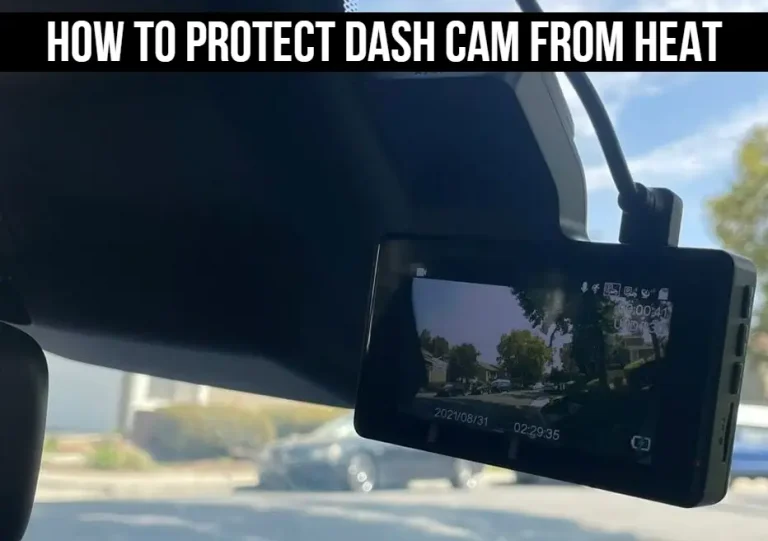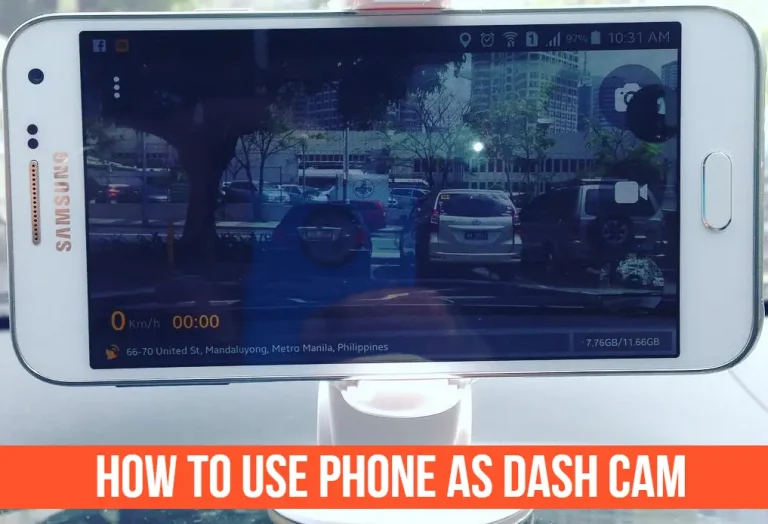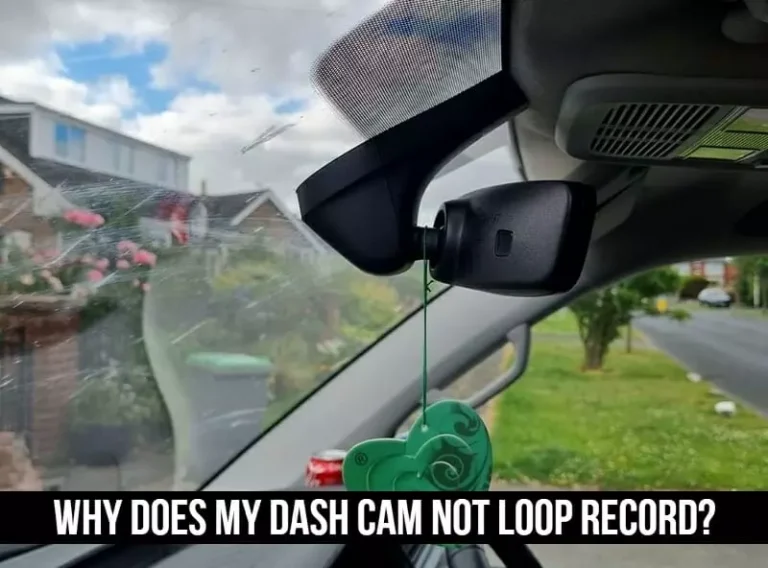Should I Hardwire My Dash Cam? – (step-by-step guide)
Dash cam is a very popular device that can be used to improve your driving experience and even help you become a better driver.
Dash cams can provide irrefutable evidence in the event of an accident, and they can also help to identify the person responsible if you are involved in a hit-and-run.
So, it is important to know how to properly use and care for your dash cam so that you can get the most out of it. One question that is often asked is whether or not you should hardwire your dash cam.
When it comes to safety, hardwiring your dash cam is always the best option. This is because hardwiring will ensure that your dash cam will always be powered on and recording, even if your car’s battery dies.
In this article, we will discuss the pros and cons of hardwiring your dash cam. We will also provide a step-by-step guide on how to properly hardwire your dash cam. So, let’s get started!
Should you hardwire your Dash Cam?

The answer is yes. The best way to install a dash cam so that it is powered constantly, even while the engine is off of your car or fleet, is to hardwire it to the fuse box.
It provides a continuous supply of electrical power, eliminating the requirement for your dash cam to be hooked into your car’s cigarette lighter socket.
Hardwiring will ensure that your dash cam will always be powered on and recording, even if your car’s battery dies.
It will also protect your dash cam from being stolen. Plus, if you live in an area with extreme weather conditions, then hardwiring your dash cam can help to prevent damage from moisture and extreme temperatures.
How to hardwire your Dash Cam? (step-by-step guide)

The answer is yes. The best way to install a dash cam so that it is powered constantly, even while the engine is off of your car or fleet, is to hardwire it to the fuse box.
It provides a continuous supply of electrical power, eliminating the requirement for your dash cam to be hooked into your car’s cigarette lighter socket.
Hardwiring will ensure that your dash cam will always be powered on and recording, even if your car’s battery dies.
It will also protect your dash cam from being stolen. Plus, if you live in an area with extreme weather conditions, then hardwiring your dash cam can help to prevent damage from moisture and extreme temperatures.
What supplies do you need to do so?
To hardwire your dash cam, you will need the following supplies:
- Wire Strippers
- Wire Cutters
- Electrical Tape
- A Drill
- A Small Drill Bit
- Wire Ties
- Dielectric Grease
- A Voltage Meter
- A 12v Power Supply
Step-By-Step Guide
We’ll explain today’s self-installation instructions for a dash cam with hardwire kit. Get power from your car’s fuse box in just eight short steps.
In this manner, you can use the 12V socket for another mobile device. A dash cam with a hardwire kit can be installed quickly and easily. Let’s get going!
STEP 1: Begin by stripping about 1” of insulation off the end of the red and black power wires using wire strippers.
STEP 2: Cut a small hole in the firewall using a drill and a small drill bit. The hole should be big enough to fit the power wires through, but not so big that it compromises the integrity of the firewall.
STEP 3: Feed the power wires through the hole in the firewall and route them to the engine bay.
STEP 4: Once you have routed the wires to the engine bay, use electrical tape to secure them in place. Be sure to leave enough slack so that the wires can move freely as the engine vibrates.
STEP 5: Locate the positive and negative terminals of your car battery. The positive terminal will typically be marked with a “+” sign, while the negative terminal will be marked with a “-” sign.
STEP 6: Attach the black power wire to the negative terminal of the battery and the red power wire to the positive terminal of the battery.
STEP 7: Use wire ties to secure the power wires in place.
STEP 8: Apply a small amount of dielectric grease to the terminal connections to help prevent corrosion.
STEP 9: Test the connection by turning on your dash cam. If everything is working properly, then you’re all set!
What other options do you have?

If you don’t want to hardwire it, you can utilize an external battery pack or link it to a lighter port or USB in your car.
The drawback of using an external battery is that you must charge it, and your commute is likely too short of giving it a full charge. Utilizing a lighter socket is the second option.
You won’t be able to activate parking mode or use the cigarette lighter plug in your car if there is no battery to charge.
The USB port activates parking mode; however, you must disconnect and replug it every time you need to use it for something else (such as a telemetry device or an insurance dongle).
The Pros And Cons Of Hardwiring Your Dash Cam

PROS/ADVANTAGES
- Drainage Prevention: One of the main advantages of hardwiring your dash cam is that it will prevent your car’s battery from being drained. If you leave your dash cam powered on for an extended period, then it can drain your car’s battery.
This is especially true if you have an older car or if your dash cam is constantly recording. Hardwiring your dash cam will ensure that it only draws power when it is turned on, which will help to prolong the life of your car’s battery. - Security: Hardwiring your dash cam will also help to protect your dash cam from being stolen. If your dash cam is not hardwired, then it is easy for a thief to simply unplug it and take it with them.
However, if your dash cam is hardwired, then the thief would need to know how to remove the hardwired connection, which is much more difficult. - Improved Video Quality: Another advantage of hardwiring your dash cam is that it can help to improve the video quality. This is because hardwiring your dash cam will provide a more stable power source, which can help to prevent the video from being blurry or distorted.
CONS/DISADVANTAGES
- Difficult to Install: Hardwiring your dash cam can be difficult to install, especially if you are not familiar with working with wires. Additionally, if you do not route the wires correctly, then it can be difficult to access your dash cam if you need to remove it.
- Potential Damage: If you do not hardwire your dash cam correctly, then you run the risk of damaging your car’s electrical system. This is because the power wires can short circuit if they are not installed correctly.
- Visible Wires: One of the main disadvantages of hardwiring your dash cam is that the wires will be visible. This can be a problem if you are trying to hide your dash cam from view. Additionally, the wires can be a trip hazard if they are not routed properly.
What are some tips for installing a hardwired dash cam in your car successfully without any problems?

Some tips for installing a hardwired dash cam in your car successfully include:
- Understanding your car’s electrical system
- Being familiar with working with wires
- Correctly routing the wires
- Using dielectric grease to prevent corrosion
- Testing the connection before finalizing the installation.
Frequently Asked Questions
What are the benefits of using hardwire dash cam over a regular dash cam?
The main benefits of using a hardwired dash cam over a regular dash cam are that it will prevent your car’s battery from being drained and it will help to improve the video quality.
Can you install your dash cam hardwire?
The dash camera doesn’t need to be hooked into the 12v socket in your car if you use a hardwire kit. By hardwiring your dash camera straight into your fuse box, you may install a system that will supply it with electricity continuously without turning on the ignition.
How much does a hardwired dashboard camera typically cost compared to other types of dashboard cameras on the market today?
A hardwired dashboard camera typically costs more than other types of dashboard cameras on the market today. However, the increased cost is typically offset by the increased benefits that a hardwired dash cam provides.
How long does it take to install a hardwired dash cam in my car?
It typically takes about 30 minutes to install a hardwired dash cam in your car. The time can vary depending on your car’s electrical system and your familiarity with working with wires.
Can hardwiring a dash cam affect the car?
Your worry about battery drain on your car is entirely gone with a hardwired system. Customers who want to use the 24-hour triggered parking mode function in dash cams with that feature must hardwire their devices.
Conclusion
The bottom line is that hardwiring a dash cam can provide peace of mind and may be worth the hassle, depending on your needs.
If you’re frequently on the road or drive in areas with known theft problems, a hardwired dash cam could be a valuable addition to your vehicle.
If you don’t fall into either of these categories, though, you may not need all the extra protection offered by a hardwired camera and can probably save yourself some money by going with a battery-powered model instead.
We hope this guide answered any questions you may have had about hardwiring your dash cam. If you have any further questions, please feel free to contact us. We will be happy to help!






